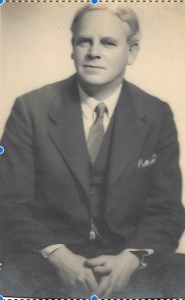To close this window and return to Men associated with  Tottenham click here
Tottenham click here
NORMAN IERSON PARLEY (1882 – 1961)
Norman Ierson Parley didn’t actually live in Tottenham and he didn’t appear before the Tottenham Tribunal, but he gives his occupation as managing clerk at Spong & Co.’s Tottenham works in 1916 according to the records of the Welwyn Tribunal in July 1916. Spong & Co. Ltd., manufactures of knife cleaners, food choppers &mincers and coffee mills, are listed at 27 Braemar Road, South Tottenham, in the 1915 London Post Office Directory. We think this gives him a connection to the group of Haringey COs, even though his residential address was ‘Evergreen’ cottage, Woolner Green, Near Knebworth, Herts and he was a Quaker member of the Hertford and Hitchin Monthly Meeting.
He came from a family of Unitarian Christians part of a long tradition of dissenting. His mother’s father, Henry Ierson, had been a minister at the South Place Ethical Society, a congregation of non-conformists in 1856, now known as Conway Hall Ethical Society. Norman’s father died in 1901 and he spent some time living with his grandfather. From various records we know that both Norman and his brother, John Ernest Parley, were COs. Norman did not only work for Spong & Co, which at the time was perhaps one of the most well known kitchen appliance manufacturers in the country, he married one of the Spong daughters, Irene Osborn Spong, in 1910. By 1911 the census records he was living with his mother, Agnes, and brother John, at Holmcroft, 131 Hampstead Way, Hendon. His wife is not recorded but their son Ivor was born in 1911 and their daughter Joan in 1914. Through his marriage, Norman became connected with another family which had strong traditions of non-conformity. His mother-in law, Frances, was an active member of the women’s suffrage movement and it seems that her daughters were also committed to the struggle for the vote. Like many other suffragists, neither Frances nor Irene and her sister Minnie were at home on the night of the 1911 census. In protest, Irene wrote on her census return: ‘Until I receive the full rights of citizenship I shall refuse to perform the duties of a citizen. No vote, no census’.
Just four years later, after the outbreak of war we find that Norman was working for the Friends War Victims Relief Committee and was in Holland from 1915, helping Belgian refugees and other civilians in internment camps. He joined his mother, Agnes Ellen Parley, who was already there. As his daughter later explained, they were working with ‘…refugees and sick and mental patients and helping to bring them to England through the dangerous waters of the English Channel’. Norman was there until June 1918 when he came back to England when, under the auspices of the Friends Ambulance Unit, he was working in agriculture in East Grinstead, giving his address as Warren Farm, Felbridge, East Grinstead, where his parents in law also lived. He was finally demobbed in December 1918. Ernest too was accepted by the Friends Ambulance Unit, managing to successfully claim total exemption from military duties.
Though Norman served with the Quakers, he and Irene, together with Irene’s sister Dora and her husband, were followers of the Order of the Cross, a Christian, pacifist vegetarian fellowship formed in 1904 by a former Congregationalist, John Todd Ferrier. Norman wrote hymns for the organisation’s services which were informal in style and often held in members’ homes.
After the war Norman and Irene lived in a house which he designed, in Chorleywood, Hertfordshire. Norman worked for Lund Humphries Printers and Publishers, his occupation being given as ‘retired printer’ at the time of his death. He and Irene died within a year of each other, in 1960 and 1961 respectively.
PR/IWM, Quakers in Britain archives and information from Ancestry correspondent and Norman Parley’s grandson.
Joanna Bornat
Leave a comment